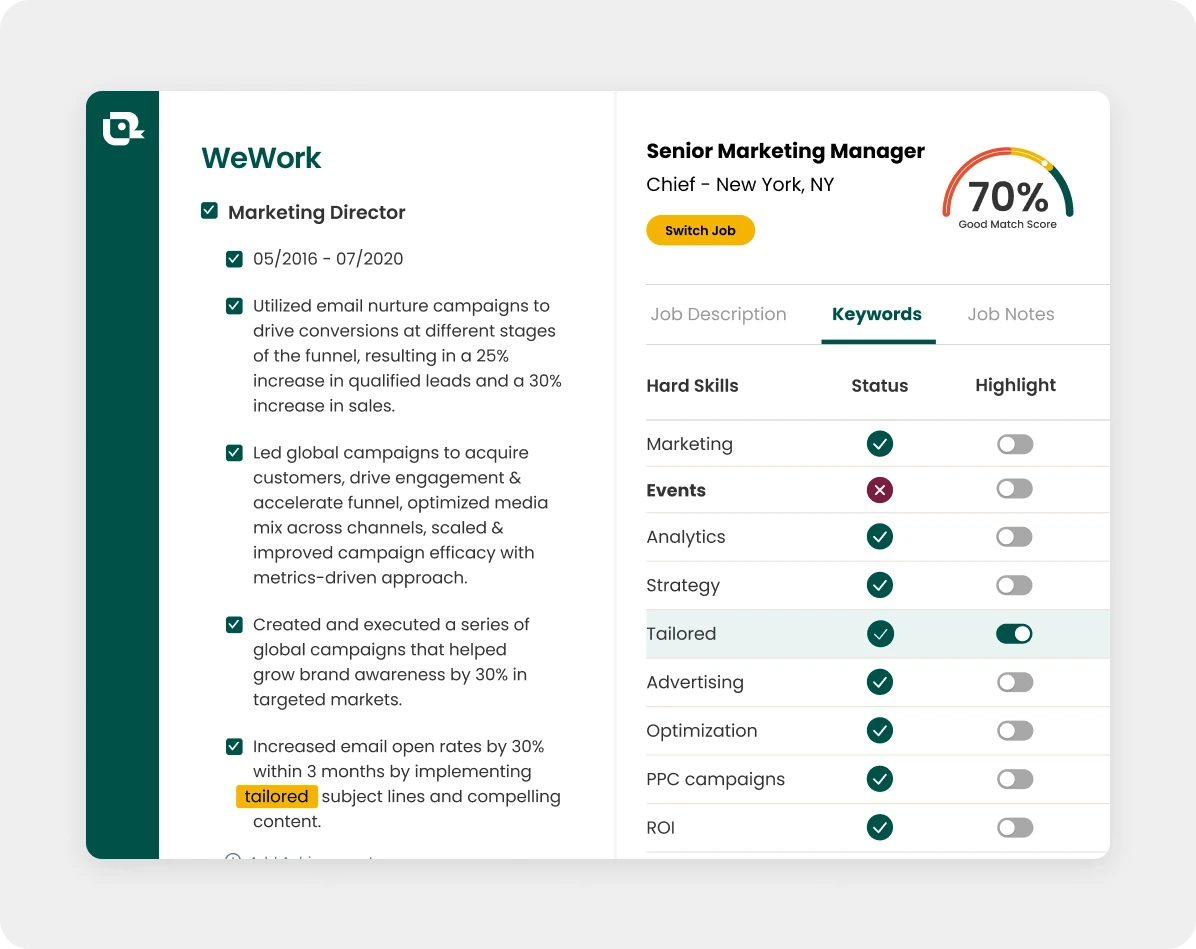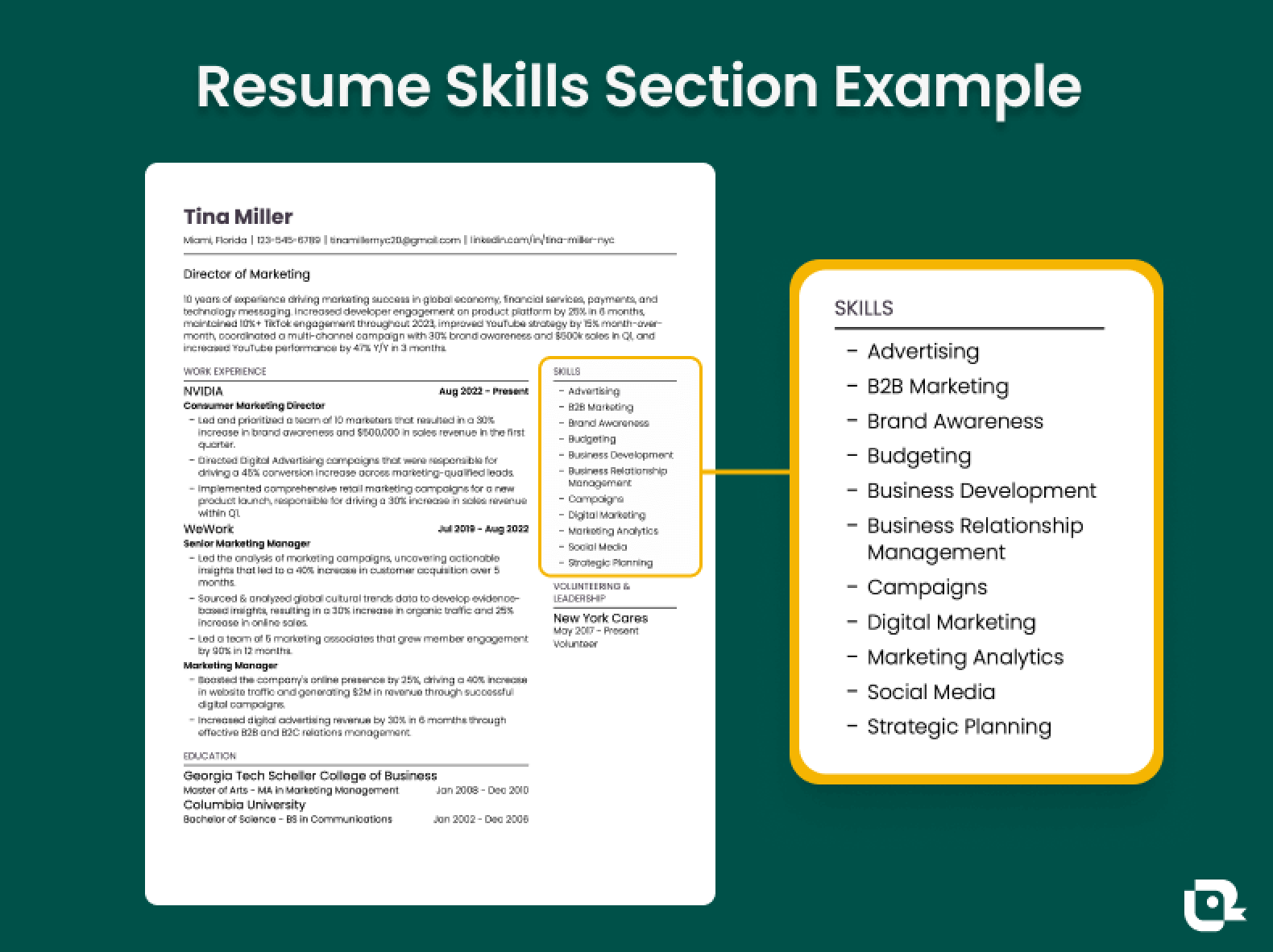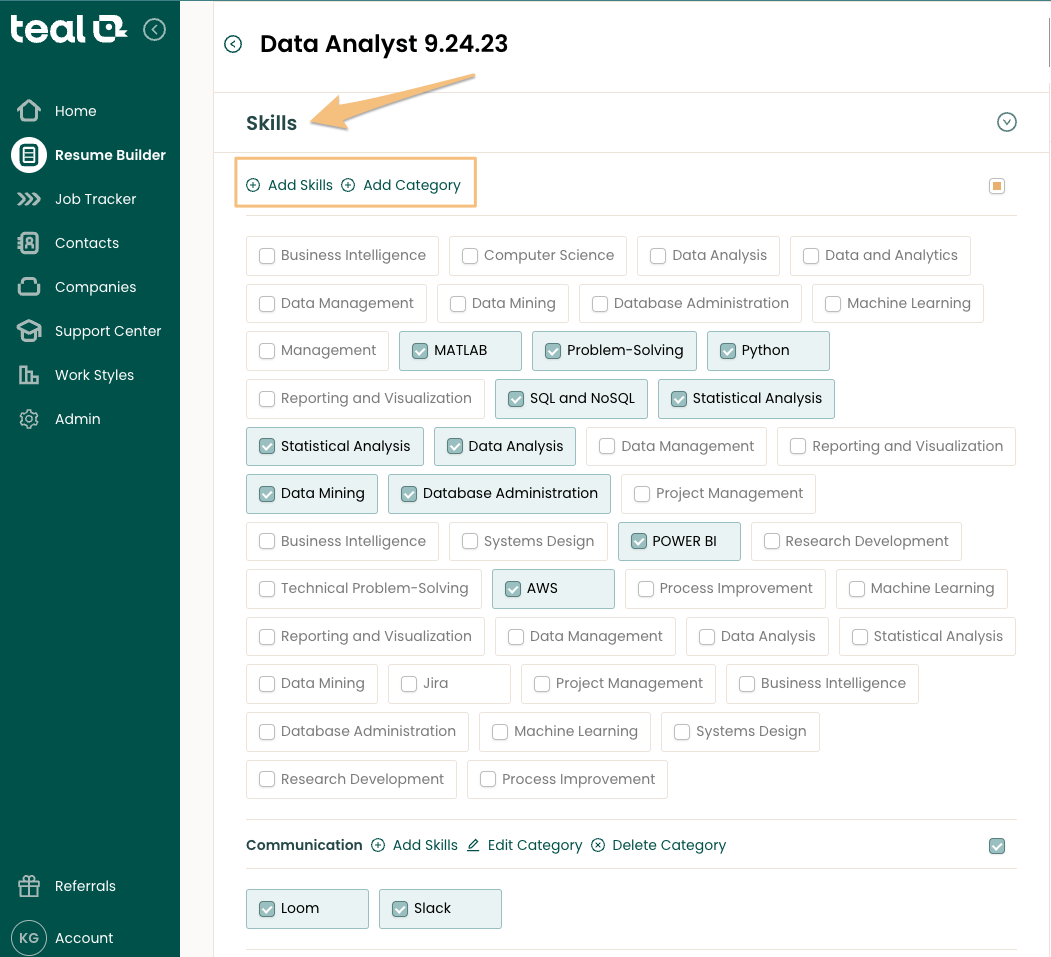

The Microsoft Office suite remains the gold standard for productivity software in the workplace.
According to Inc, Microsoft Office is the most popular app used by businesses. With over 1.2 billion users and applications like Word, Excel, PowerPoint, and Outlook deeply embedded in daily business operations, proficiency in Microsoft Office suite is more than a resume booster—it's a necessity.
Employers across industries want candidates who know how to leverage these productivity tools to streamline processes and drive results. This guide walks through the process of effectively showcasing Microsoft Office skills on your resume, including which Microsoft Office suite apps are worth mentioning.
Struggling to highlight your skills and expertise effectively? Get started with Teal's Free Resume Builder to get it right.
Microsoft Office, or MS Office, skills refer to the ability to efficiently use applications such as Word, Excel, PowerPoint, and Outlook for various tasks. These skills enable employees to create and manage documents, analyze data, deliver presentations, and handle email communications effectively.
Mastering these applications enhances productivity, facilitates collaboration, and supports a wide range of business operations across different industries.
Those well-versed in Microsoft Office are highly valued by employers for several reasons:
Mastering these applications demonstrates your ability to contribute to a company's workflow and adapt to different job duties and responsibilities.
When listing your Office skills, focus on the following core apps:
To accurately represent your skills, it's essential to understand the different proficiency levels:
Evaluate your skills using these methods:
If you want an office job, basic Office skills are a non-negotiable. Unless the job description specifically mentions basic Microsoft Office apps like Word and and Outlook, assume they are implied and omit them in favor of more niche software skills. The exception: if you possess advanced Word and Outlook skills that could set you apart. For instance, basic functions for data entry or mail merging set a solid foundation for administrative roles.
Once you master the basics, adding intermediate and advanced skills can significantly enhance your efficiency. Skills like advanced Excel functions and PowerPoint presentations are crucial for many desk roles.
Mastering advanced Microsoft skills can open doors to in-demand positions. Skills like complex Excel formulas, VBA, and project management software are essential for higher-level roles.
Before you can list Microsoft Office skills, you need to choose the right ones to highlight. Selecting the right ones can significantly increase your chances of getting noticed by employers and passing through applicant tracking systems (ATS). Here are three tips to choosing the right MS Office skills for your resume:
Research the specific skills required in your industry. Different industries prioritize different Microsoft Office skills, so understanding what is essential in your field will help you highlight the most relevant abilities on your resume.
Learn about the company's preferred tools and technologies. Each organization may have its own set of preferred software and systems, and knowing these can give you an edge in the application process. The most critical company systems and software are often outlined in the job description.
Analyze job descriptions to identify the most frequently mentioned skills, or use Teal's Matching Mode to automate this. Teal grades your resume based on how well it aligns to the job description and then suggesting keywords to maximize your fit. Tailoring your skills to match the job description not only showcases your job qualifications but also demonstrates your attention to detail.

Effectively listing Microsoft Office skills on a resume can showcase your technical expertise and make you a more attractive candidate to potential employers.
Pro tip: In addition to your resume, It can also be beneficial to highlight relevant skills in your cover letter - explore Teal's Microsoft Word cover letter templates to help you get started!
Incorporate Office skills in your professional summary to complement your most notable accomplishments and technical expertise. For example: "Detail-oriented professional with 5+ years of advanced Microsoft Excel and PowerPoint experience, specializing in data analysis and compelling presentations."
Pro tip: To add skills to your professional summary using Teal's AI Resume Builder, scroll to Professional Summaries, click the drop-down button, then "Add Professional Summary." You can create one from scratch or click the "Write With AI" button.
Create a dedicated resume Skills section to highlight your skills related to the job description. This section should list your most proficient and in-demand Office skills to catch the employer’s attention quickly.

Example
Pro tip: To add skills to your "Skills" section in Teal, scroll to Skills, click the drop-down button, then "Add Skills." Here you can list your skills individually in addition to incorporating them into a summary or bullet points.
Including Microsoft Office skills in your work experience bullet points can illustrate how you effectively applied these skills to achieve impact.
Example
"Developed complex Excel models that reduced reporting time by 30% and improved forecast accuracy by 15%."
Pro tip: To add skills to your work experience, from the Resume Builder, scroll to Work Experience. Click the drop-down button, then "Add Work Experience" to create a new section or "Add a Bullet" to incorporate skills into an existing work history.
Teal Note: While the first three methods below may be popular, we do not recommend adding graphics, images, or proficiency descriptions to your skills unless they are specifically requested by a prospective employer.
Create a visual representation of your skills and proficiency levels:
Microsoft Word: ●●●●○ (Advanced)
Microsoft Excel: ●●●●● (Expert)
Microsoft PowerPoint: ●●●○○ (Intermediate)
Use horizontal bars to indicate proficiency levels:
Provide brief explanations of your capabilities:
- Microsoft Word: Advanced (Expert in document formatting, mail merge, and collaboration tools)
- Microsoft Excel: Expert (Proficient in complex formulas, pivot tables, and VBA macros)
- Microsoft PowerPoint: Intermediate (Skilled in creating engaging presentations with animations and multimedia elements)
Quantifiable Bullet Points
Highlight productivity improvements and showcase cost savings or revenue increases:
Example
"Automated monthly reporting process using Excel macros, saving 10 hours of work per month and reducing errors by 95%."
Project-Specific Applications
Describe how you've applied Microsoft Office tools in specific projects:
Example
"Created a comprehensive project management dashboard in Excel, enabling real-time tracking of key metrics across 15 concurrent projects."
Types of Microsoft Office Certifications
1. Microsoft Office Specialist (MOS)
2. Microsoft Office Specialist Expert
3. Microsoft Office Specialist Master
How to List Microsoft Office Certifications
Include certification names, dates obtained, and expiration (if applicable):
Example
"Microsoft Office Specialist Expert (Excel 2019) - Obtained May 2021"
It's critical to tailor skills to each job as the same role could require different skills depending on the company's tech stack.
Here are examples of how to group and list specific Microsoft Office skills for common roles:
Using Teal’s Resume Skills Management feature, you can easily add skills to your resume, ensuring they're presented in a clear and compelling manner.

Microsoft skills are critical in many industries. Here’s how Office skills translate into five popular sectors:
Learning Microsoft apps is essential for staying competitive in today's job market. Here are some effective ways to learn and improve your Microsoft skills:
Online courses and tutorials are a convenient way to learn Microsoft skills at your own pace. Many platforms offer comprehensive courses on a wide range of topics, from basic literacy to more advanced skills in data analysis.
Earning certifications can validate your skills and make you more attractive to potential employers. Many organizations offer certification programs for various Microsoft skills:
For more certifications worth adding to your resume, check out this guide on resume certifications.
Practical experience is crucial for mastering Microsoft skills. Here are some tips for gaining hands-on experience:
There are many free resources available to help you learn and practice Office suite skills:
Participating in online communities can provide support, resources, and networking opportunities:
Microsoft Office is integral to many jobs. Here are ten popular roles where key Office skills are crucial, with varying use cases:
The Office suite encompasses a broad range of abilities that enable you to perform essential tasks efficiently. Here’s a deeper look at why they matter:
Gaining and improving Office skills can dramatically impact your earning potential. As the demand for tech-savvy professionals grows, those with advanced Excel skills often command higher salaries and have access to a wider range of job opportunities.
Effectively showcasing your Microsoft Office skills on your resume is crucial in today's competitive job market. By following the strategies outlined in this guide, you can significantly improve your chances of landing interviews and securing your desired position. Remember to tailor your skills to each job application, provide specific examples of your expertise, and continue developing your Microsoft Office proficiency to stay ahead in your career.
Ready to create a standout resume that highlights your skills? Use Teal's resume maker to craft a professional, ATS-friendly resume that showcases your expertise and helps you land your dream job.